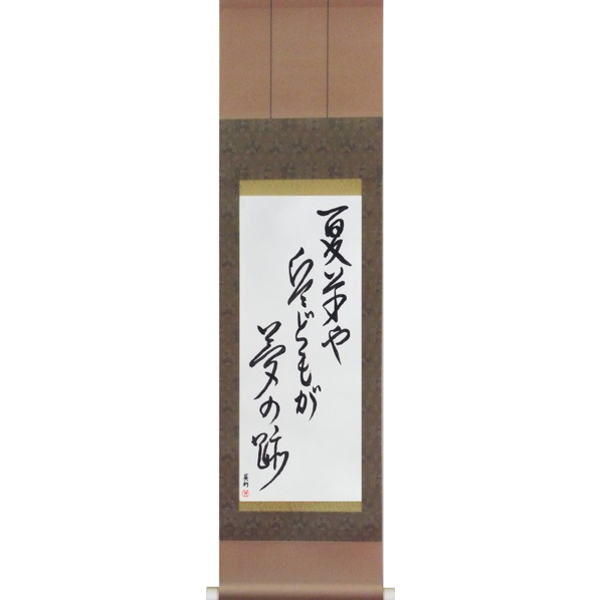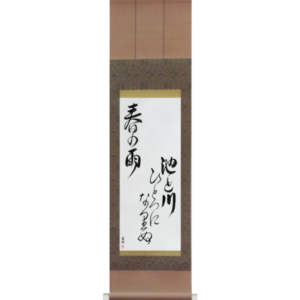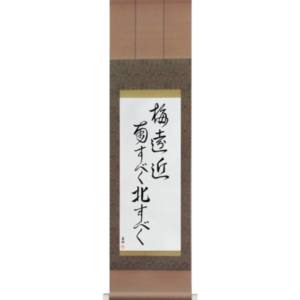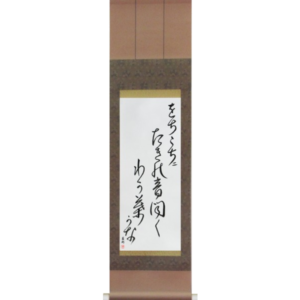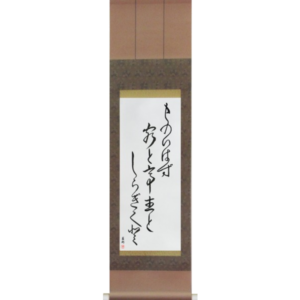H3032 Haiku By Basho – Summer grass …
by Master Japanese Calligrapher Eri Takase
Summer grass,
all the warriors are,
but the remains of dreams [1]
|
natsukusa ya tsuwamono domo ga yume no ato |
夏草や 兵どもが 夢の跡 |
| bashou | 芭蕉 |
William Nelson suggests the translation:
Summer grasses –
Remains of
Warrior’s Dreams [2]
Jane Reichhold suggests the translation:
Summer grass
the only remains of soldiers’
dreams [3]
Hiroaki Sato suggests the translation:
Summer grass: where the warriors used to dream [4]
Asataro Miyamori titles this haiku The Ruins of Takadachi Fort:
Ah, summer grasses wave!
The warriors’ brave deeds were a dream! [5]
Miyamori writes:
The original is elliptical and consequently ambiguous, and might lead a casual reader to construe it as :- “Ah! summer grasses wave where the warriors dreamed of glory.” The phrase Yume no ato which is a puzzle to most readers implies as much as “did heroic deeds which have proved empty as a dream”.
The ruins of Takadachi Fort are found at the village of Hiraizume, Iwai County, in the province of Rikuchu. Seven centuries ago General Yoshitsune and his seven or eight loyal men were besieged in this small for by General Yasuhira’s troops. They fought bravely and achieved brilliant deeds, but, far outnumbered, died at last a heroic death.
It is now summer. The ruins are overgrown with grasses. Of old the brave warriors fought against heavy odds and achieved brilliant deeds. But their achievements have proved empty as a dream.
The emotional poet, filled with such reflections, burst into tears, as he confesses in his famous account of travel, “A Narrow Pass through Oshu” [4] [6].
This is one of Basho’s most famous verses. [5]
Basil Hall Chamberlain suggests the translation:
Haply the summer grasses are
A relic of the warriors’ dream. [5]
William N. Porter suggests the translation:
Asleep within the grave
The soldiers dream, and overhead
The summer grasses wave. [5]
Curtis Hidden Page suggests the translation:
Old battlefield, fresh with spring flowers again –
All that is left of the dream
Of twice ten thousand warriors slain. [5]
Inazo Nitobe suggests the translation:
The summer grass!
‘Tis all that’s left
Of ancient warriors’ dreams. [5]
R. H. Blyth suggests the translation:
The summer grasses,
All that remains
Of the warriors’ dreams [7]
Translation Notes:
夏草 natsukusa – summer grass
兵 tsuwamono – soldier
夢 yume – dream(s)
跡 ato – remains, ruins
References:
[1] Translation by Timothy L. Jackowski, Takase Studios, LLC.
[2] 80.
[3] 137.
[4] Sato, Hiroaki. (1996). Basho’s Narrow Road: Spring and Autumn Passages
. Stone Bridge Press. 87.
[5] 125-126.
[7] . 26.
